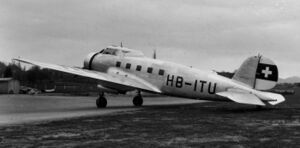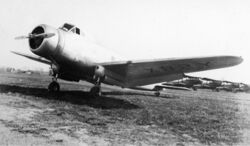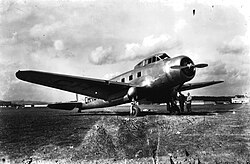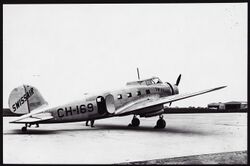Engineering:General Aviation GA-43
| GA-43 | |
|---|---|

| |
| General Aviation GA-43 HB-ITU in service with Swissair | |
| Role | Airliner |
| National origin | United States of America |
| Manufacturer | General Aviation |
| Designer | Virginius E. Clark[1] |
| First flight | 22 May 1932 |
| Primary user | Swissair |
| Number built | 5 |
The General Aviation GA-43 was a single engine low-wing monoplane airliner produced in small numbers in the United States in the mid-1930s, also known as the Pilgrim 150, Fairchild 150, and sometimes but erroneously as the Clark GA-43 for the designer, Virginius E. Clark who was also responsible for the Clark Y airfoil section used.[1]
The prototype was developed and built by Fairchild's American Pilgrim division, but the program was taken over by General Aviation when the firm purchased American Pilgrim shortly before the prototype had flown. Although this first flight took place in 1932, manufacture did not commence until 1934, by which time General Motors had, in turn, gained a controlling interest in North American Aviation and merged it with General Aviation, which they already owned. The result of this was that the GA-43 became the first aircraft produced by North American.
Development

The GA-43 was a conventional low-wing cantilever monoplane of all-metal construction. The prototype had fixed tailwheel landing gear, but the main units of this were later changed to be made retractable, and three of the four production examples also had retractable mainwheels, while the fourth aircraft had twin floats instead. The oval-section fuselage contained a ten-seat passenger cabin, and the cockpit was located atop the fuselage under a separate canopy.
Operators


 Colombia
Colombia- Sociedad Colombo Alemana de Transportes Aéreos (SCATA) (1 aircraft on floats)
 Manchukuo
Manchukuo
- A single example was used by the Manchukuo National Airways
 Spain
Spain- Líneas Aéreas Postales Españolas (LAPE) (1 aircraft)
 Switzerland
Switzerland- Swissair (2 aircraft)
Specifications
Data from American airplane specifications[2]
General characteristics
- Crew: two pilots
- Capacity: ten passengers
- Length: 43 ft 8 in (13.31 m)
- Wingspan: 53 ft 0 in (16.15 m)
- Height: 12 ft 9 in (3.89 m)
- Wing area: 460 sq ft (43 m2)
- Airfoil: Clark Y[3]
- Empty weight: 5,460 lb (2,477 kg)
- Gross weight: 8,750 lb (3,969 kg)
- Fuel capacity: 176 US gal (147 imp gal; 670 L)
- Powerplant: 1 × 9-cylinder air-cooled Wright R-1820 Cyclone radial engine , 712 hp (531 kW)
- Propellers: 10 ft 0 in (3.05 m) diameter
Performance
- Maximum speed: 210 mph (340 km/h, 180 kn)
- Cruise speed: 190 mph (310 km/h, 170 kn)
- Stall speed: 59 mph (95 km/h, 51 kn)
- Range: 680 mi (1,090 km, 590 nmi)
- Service ceiling: 22,000 ft (6,700 m)
- Rate of climb: 900 ft/min (4.6 m/s)
See also
- 1932 in aviation
Aircraft of comparable role, configuration and era
- Boeing Monomail
- Breese-Dallas Model 1
- Junkers Ju 160
- Manshū Hayabusa
- Northrop Delta
- Kharkiv KhAI-1
- Vultee V-1
References
Citations
- ↑ 1.0 1.1 Eckland, 2009
- ↑ Aviation April 1934, pp 123–124
- ↑ Lednicer, David. "The Incomplete Guide to Airfoil Usage". https://m-selig.ae.illinois.edu/ads/aircraft.html. Retrieved 16 April 2019.
Bibliography
- "American airplane specifications". Aviation 33 (4): 122–124. April 1934. https://archive.org/details/Aviation_Week_1934-04-01/page/n15/mode/2up.
- Taylor, Michael J. H. (1989). Jane's Encyclopedia of Aviation. London: Studio Editions. p. 417.
- "The Clark GA-43 Commercial Monoplane". Flight: 1176. 23 November 1933. http://www.flightglobal.com/pdfarchive/view/1933/1933%20-%201056.html. Retrieved 2008-04-03.
- Eckland, K. O. (26 April 2009). "American Airplanes GA-GO - General Aviation". Aerofiles.com. http://www.aerofiles.com/_ga.html. Retrieved 21 April 2021.
 |
